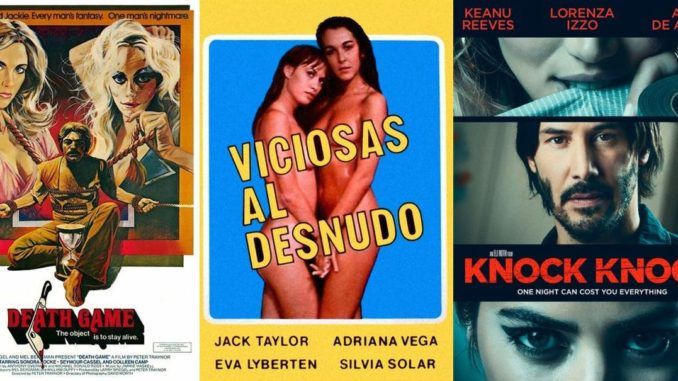
Keanu Reeves and Ana de Armas are currently sharing the screen in Ballerina, but it’s not their first time working together. A decade ago, they also made Knock Knock for director Eli Roth, a film which… provoked a lot of strong reactions, shall we say. I didn’t realize it initially, but turns out this was a remake of a moderately obscure exploitation film from the seventies, Death Game (stars Colleen Camp and Sandra Locke received production credits on Knock Knock). It wasn’t the first remake either, with a bootleg copy, Vicious and Nude, being made in Spain a couple of years after the original came out.
So, three versions of the same film, made over the period of forty-five years. But which is best? Let’s find out, and see if we can learn any moral lessons about the importance of marital fidelity…
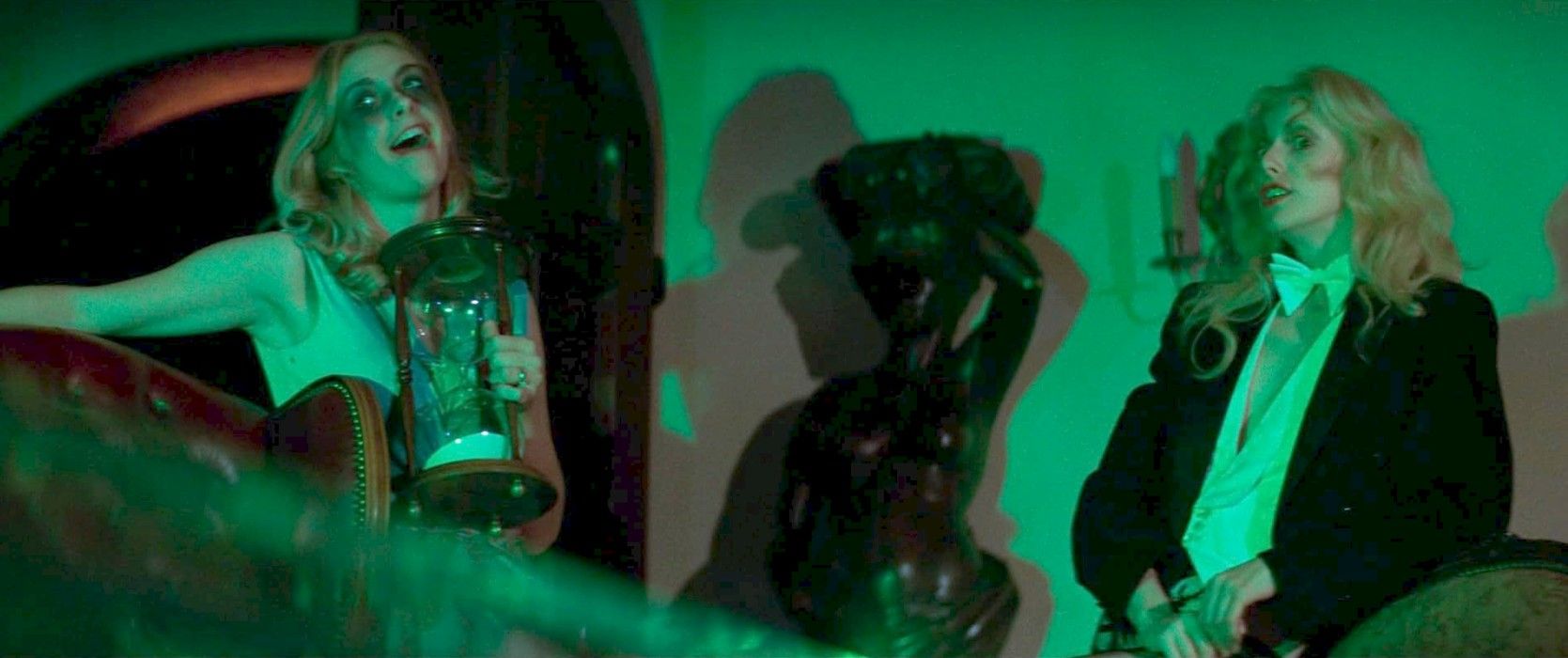
Death Game (1977)
Rating: C+
Dir: Peter S. Traynor
Star: Seymour Cassel, Sondra Locke, Colleen Camp, Beth Brickell
The home invasion film has been around for a long time – some suggest as far back as 1909 silent The Lonely Villa, starring Mary Pickford. However, it seems undeniable the sub-genre took on new momentum following the Manson Family Murders in 1969. After those, it was clear, if even Hollywood stars weren’t safe, nobody was. Those killings were still relatively fresh in society’s collective memory, having happened barely a handful of years before the movie was filmed in October 1974. [Fun fact: Sissy Spacek and Bill Paxton worked as set dressers] No wonder the film opens with a caption, “This motion picture is based on a true story. It should serve to remind us that fate allows no man to insulate himself against the evil which pervades our society.”
True? Well… Co-writer Michael Ronald Ross supposedly did pick up a hitch-hiking hippie and took her home, finding her rather harder to get rid of. But this is mild compared to the fate befalling architect George Manning (Cassel), after he opens the door to Jackson (Locke) and Donna (Camp), a pair of very moist teenagers, supposedly lost in a storm. Though I should probably say “teenagers”, considering Locke was actually in her thirties at the time of shooting, and Camp aged 21. Cassel, meanwhile, looks like a discount Oliver Reed, and was so unhappy on set, he refused to do any post-production dubbing, forcing editor David Worth to re-voice all his lines. [Mind you, Clint Eastwood was involved at one point, which would have been interesting]
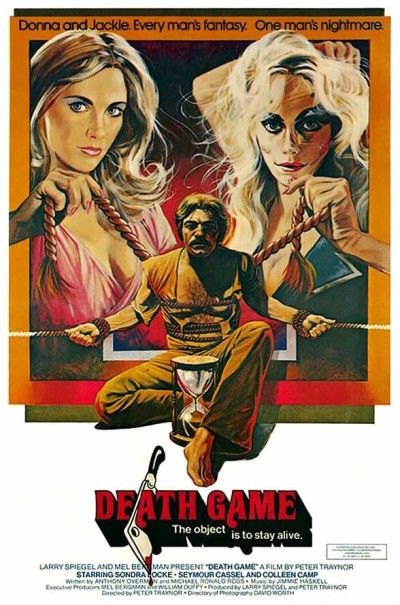 I think the first half works better than the second, especially if you’ve seen any of the other versions, and consequently know where we are going. It lends a certain inevitable, almost Shakespearean tragedy to the situation, despite the remarkable speed with George goes from happily married to “threesome with jailbait”. He also manages to get rid of them, at least temporarily, driving the pair to the bus station, only for them to return – and this is when things become almost relentlessly bleak. Some subsequent critics have tried to paint the movie as feminist; I’m inclined to disagree, given the barking mad performances delivered by Locke and Camp, appearing to take “hysterical” as a starting point for largely improvised portrayals.
I think the first half works better than the second, especially if you’ve seen any of the other versions, and consequently know where we are going. It lends a certain inevitable, almost Shakespearean tragedy to the situation, despite the remarkable speed with George goes from happily married to “threesome with jailbait”. He also manages to get rid of them, at least temporarily, driving the pair to the bus station, only for them to return – and this is when things become almost relentlessly bleak. Some subsequent critics have tried to paint the movie as feminist; I’m inclined to disagree, given the barking mad performances delivered by Locke and Camp, appearing to take “hysterical” as a starting point for largely improvised portrayals.
The results are all fairly sloppy, particularly in an ending which can only have been resulted from some kind of wager, as to the stupidest way a film can finish. Yet therein lies its charm, at least to some extent, because it’s when the home invaders are at their most insane and unpredictable, that the movie is at its strongest. Nobody here is exactly sympathetic, with George’s barely token resistance indeed making him kinda creepy. It could perhaps make sense if Locke wasn’t obviously approaching twice the age of her character, and engaging in unconvincing cosplay as a teenager. Not released for almost three years after shooting finished, it’s possible it might never have seen the light of day, had Locke not become famous for The Outlaw Josey Wales.
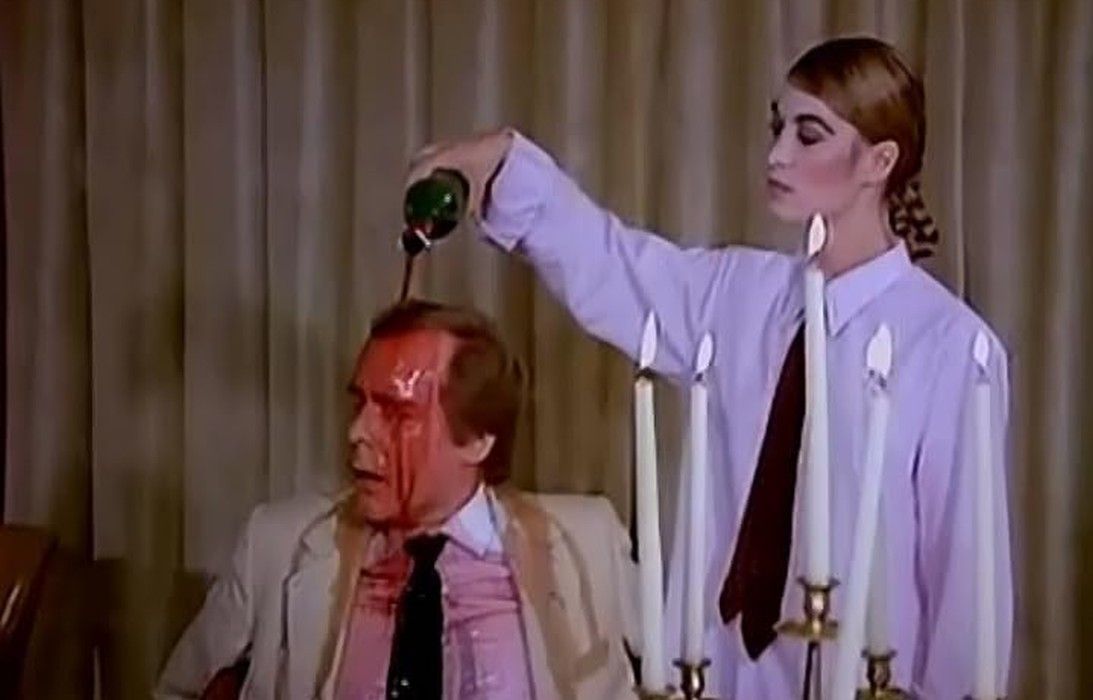
Vicious and Nude (1980)
Rating: C-
Dir: Manuel Esteba
Star: Jack Taylor, Adriana Vega, Eva Lyberten, Silvia Solar
a.k.a. Viciosas al desnudo
Spanish cinema under General Franco was heavily censored, as much for potentially problematic politics as sexual content. But it didn’t take long after Franco’s death in 1975 for state control to be relaxed, as the transition to democracy took place. By the time this unofficial remake of Death Game was released, it appears you could cram as much nudity – well, female nudity, at least – into your film as you wanted. And in Esteba’s case, that’s a lot. There’s no mistaking the inspiration of this bootleg copy, with Juan (Taylor) being visited by two attractive but mentally disturbed young women (Vega and Lyberten) while his wife Maria (Solar) is away. It’s all downhill from there for poor Jack, after the threesome.
Both films seem to make deliberately inappropriate use of music. Death Game has a startlingly perky theme, burbling on about “dear old Dad”, which then crops up subsequently on several occasions, to equally dissonant effect. Here, peak WTF? on the soundtrack is achieved with a disco version of Danny Boy. Though it’s unclear whether Esteba was actually aware of the song’s connotations, or simply using a track from his apparently extensive collection of Music to Shag By albums. This is particularly notable during the threesome, which goes on and on and on. And on – even after Jack has fallen unconscious – for about five sax-heavy tunes, before an abrupt ending. The girls may not get names, but you will become very familiar with their flesh.
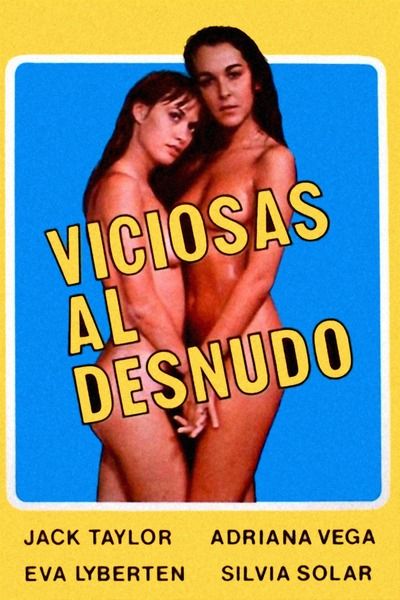 To the point of tedium, to be honest. There are considerably less scenes of them interacting with their prey, instead just lounging around in his pool, flashbacks to them robbing a flower shop, etc. Their torture is fairly light, relatively speaking. He’s made to eat paella with mustard! Wine is poured on his head (top)! If that’s all the cost of a hot threesome, viewers may be wondering where they can sign up. Indeed, the women are packed up to leave, when Jack’s agent shows up, after being contacted by a concerned Maria. The ending does share with Death Game a combination of driver’s ed film with a moral that crime must not pay. It’s less abrupt, yet still a head-scratcher.
To the point of tedium, to be honest. There are considerably less scenes of them interacting with their prey, instead just lounging around in his pool, flashbacks to them robbing a flower shop, etc. Their torture is fairly light, relatively speaking. He’s made to eat paella with mustard! Wine is poured on his head (top)! If that’s all the cost of a hot threesome, viewers may be wondering where they can sign up. Indeed, the women are packed up to leave, when Jack’s agent shows up, after being contacted by a concerned Maria. The ending does share with Death Game a combination of driver’s ed film with a moral that crime must not pay. It’s less abrupt, yet still a head-scratcher.
It’s most interesting in its differences. For example, the visitors’ ages are never brought up, unlike Death Game, where it’s used as leverage against the victim. Mind you, the age of consent in Spain at the time was twelve, so making them underage would have been tough. Jack is also a writer, who has an optimistic view of the youth of today. We first meet him debating this with his far more cynical agent, Jack saying, “Today’s young people are far healthier than those of our day, due to their lack of prejudices”. Turns out he’s not as hip to the kids as he thinks, and the generational gap is a main theme. But apart from the copious nudity, this is a forgettable copy, without much edge.
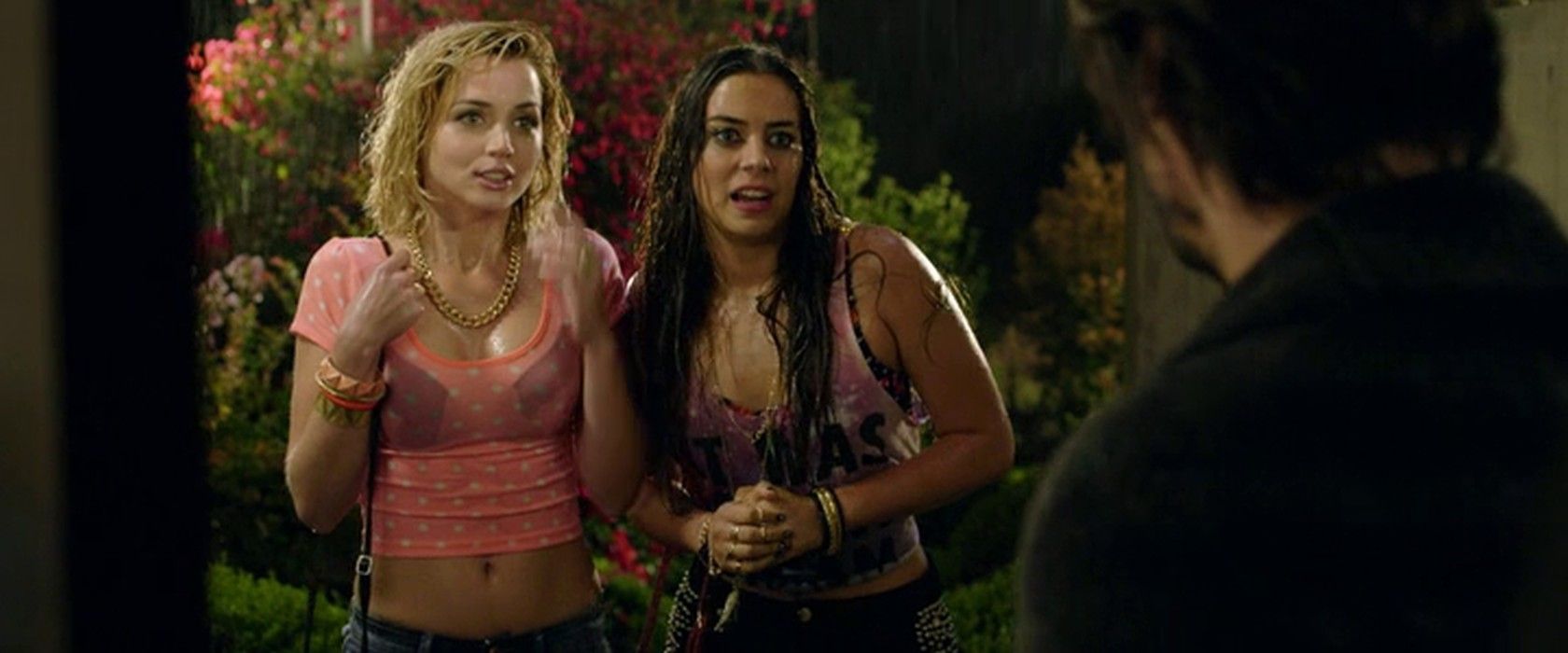
Knock Knock (2015)
Rating: B-
Dir: Eli Roth
Star: Keanu Reeves, Lorenza Izzo, Ana de Armas, Ignacia Allamand
When I originally watched this back in 2020, I didn’t know it was a remake, and I think Roth does a lot of things right, adding his own spin to proceedings. I know a lot of people loathe the film with a passion. I can certainly see why. It’s certainly not Keanu’s best performance: I suspect the role may have been more suited to Nicolas Cage. One monologue in particular feels like pure, undiluted Cage; we’ll get to that later. But I suspect it was made with greater satirical intent than generally allowed. I mean, it literally takes place on a dark and stormy night, and is basically nightmare fuel for any happily married, middle-aged man. Anyone else just won’t understand…
Here, a dream scenario (in a Penthouse Letters kind of way) goes inevitably, relentlessly and horrifically off-script. Mild-mannered architect Evan Webber (Reeves) is the perfect man: loving father and husband to Karen (Allamand), to an almost excruciating extent – again, the satire. He has to stay behind and work when his family go off for the weekend. As the rain pours down, a knock on the door reveals two lost, dripping wet, young slices of free pizza, Genesis (Izzo) and Bel (de Armas). Politely inviting them in to wait for an Uber, the girls start coming on and won’t take no for an answer. Eventually, even Evan has to crack – only to find the next morning, they won’t leave, have several screws loose, and are intent on wrecking his life.
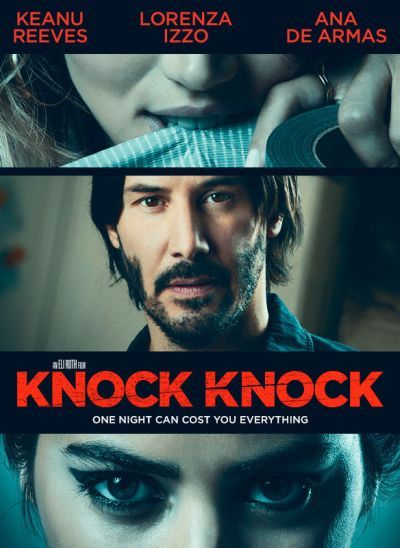 In contrast to both original inspiration Death Game and unofficial remake Vicious and Nude, the male victim feels significantly more sympathetic – as noted, to an almost parodic degree. However, a theme which remains consistent across all three films is the generation gap, and to some extent the gender gap too. The middle-aged man and the young women might as well come from different planets, and the film makes good use of social media to accentuate that point. Though Roth was in his forties when he made this, and married to Izzo, so the gap can be bridged. On the other hand, they divorced a few years after he filmed her bonking Keanu here, and Izzo then went lesbo. Read whatever into all that.
In contrast to both original inspiration Death Game and unofficial remake Vicious and Nude, the male victim feels significantly more sympathetic – as noted, to an almost parodic degree. However, a theme which remains consistent across all three films is the generation gap, and to some extent the gender gap too. The middle-aged man and the young women might as well come from different planets, and the film makes good use of social media to accentuate that point. Though Roth was in his forties when he made this, and married to Izzo, so the gap can be bridged. On the other hand, they divorced a few years after he filmed her bonking Keanu here, and Izzo then went lesbo. Read whatever into all that.
It’s pure morality melodrama, with Reeves being made to face the consequences of a momentary lapse in fidelity. If the satirical nature wasn’t clear enough before, we then get a glorious rant from Evan, which is what left me feeling like Cage might have been a better fit for the role. “What was I supposed to do? You sucked my cock, you both fucking sucked my cock! It was FREE PIZZA! Free fuckin’ pizza! It just shows up at my fuckin’ door! What am I supposed to do?” Certainly an odd choice of film for Reeves in the wake of John Wick, but I ain’t going to deny, I enjoyed most of the increasingly ludicrous and hysterical moments. Does the use at the end of Where is my Mind? – as in Fight Club – indicate it was all in Evan’s head? We’ll never know.
